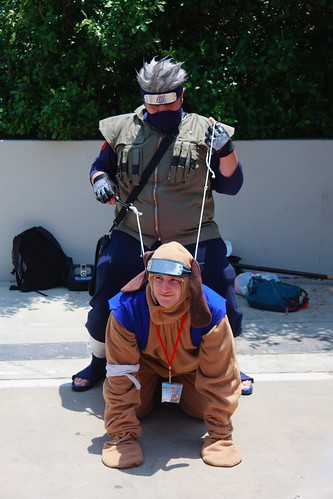NOTE FROM STEVE: Today's guest post is from Patrick Mattimore
(patrickmattimore1@yahoo.com) whose name should be well-known to veteran high school psychology teachers. Pat taught in California for many years prior to moving to Asia as he documents below. I love this post and hope that you will leave your thoughts in the comments below!
Teaching Psychology When You Don’t Teach Psychology
I live in Ho Chi Minh City and teach a variety of test prep classes to Vietnamese students. I try and work some of psychology’s lessons into my classes even though I am not specifically teaching a psychology course. For example, recently I used a rumor chain exercise (from the TOPSS activities) to introduce the students to some principles of memory.
From 2009 until earlier this year, I worked in Beijing and taught Chinese lawyers a course in legal reasoning about the American legal system.
At the beginning of each class, I did a reasoning exercise because Chinese lawyers are just as prone to confirmation bias and belief perseverance as everyone else. My goal was to convince the students to investigate problems deeply and to continue asking the next “what if” question.
One exercise I use to induce students to ask questions is intended to develop students’ critical questioning abilities. I tell students a made-up story about the contents of an empty box which I have placed in front of the class. I tell my students that inside the box is an award-winning contest model of a prototypical American high school in 2050, complete with an architect’s plan. Students then ask “yes” and “no” questions in order to attempt to guess the design. I let students guess at the “school’s design” for five minutes or so before revealing to them the empty box.
As they seize upon new information during the activity, guided by other students’ questions and my responses, students are revising their own thinking about the school’s design. Learning to adapt one’s original hypotheses based upon new information is a useful process for laypersons and psychologists alike. My job as teacher is to keep track of students’ questions in order to insure consistent answers.
The follow-up is to get students reflecting upon and discussing their own thinking processes during the activity.
Since many of my Chinese students worked as judges and prosecutors, I also wanted them to know about some basic psychological research so that they understood, for example, that our memories are fallible, leading even confident eyewitnesses to make mistakes. I gave my students a copy of an article I wrote for the San Francisco/Los Angeles Daily Journal, California’s primary legal newspaper. The article is about how a “recovered memory” was used to convict a Boston priest, despite the testimony of memory expert Elizabeth Loftus, which cast doubt upon the alleged victim’s testimony. As a follow-up to that article, students research the California Supreme Court case of Taus v. Loftus, which involves the legal issue of right to privacy, tying it to Taus’ supposed recovered memory.
China and Vietnam’s Criminal Law Codes are undergoing major revisions, but torture is still commonly used to coerce confessions. I want my students to understand why those confessions are inherently unreliable, findings directly related to the work of social psychologist Richard Ofshe.
With my Vietnamese students who intend to study or work in English-speaking countries, I am most interested in getting them to speak English since usually their English comprehension is already pretty good. One of the keys I’ve found to helping those students speak is role-playing, similar to what therapists might do to get patients to break down boundaries. My motto is speak before you think.
Another of psychology’s lessons is that we remember those things best that are most interesting to us.
So, as a homework assignment, I might ask a student to research US universities which she might like to attend or find out about music groups in Vietnam that have incorporated English lyrics in songs and then teach the class the songs.
One way psychologists can give psychology away is to write op-eds for newspapers. For the last nine years, I have been writing op-eds, often about psychological topics. It’s a great way to stay current and educate the public, if not your classes, about psychology.
Here are some suggestions. Write about how social norms can be useful to influence behavior. In China, a major health problem is smoking. There are more smokers in China than anywhere else in the world and it’s estimated that over half of the adult male population smokes and that about 40% of doctors smoke. Smoking is everywhere and is encouraged at social events where bowls of cigarettes are sometimes placed on food tables and cigarettes are a treasured gift. Obviously, since few women smoke, (about 3%) one target of campaigns to wipe out smoking in China can be that gender imbalance which seems to have encouraged males (but not females) to smoke. Here are links to some articles I wrote for Chinese newspapers about that issue.
http://www.chinadaily.com.cn/opinion/2011-08/17/content_13129872.htm
http://archive.tobacco.org/news/306712.html
http://archive.tobacco.org/news/313648.html
Teachers can also write about how understanding basic statistical information can help people become better informed citizens. For example, in China the newspapers often report statistical surveys that are based upon poor methodology. Sometimes, policy makers propose new legislation relying on a few vivid anecdotes. When that happens, it’s a good opportunity to highlight the availability heuristic and point out that policies should be based upon data, not drama.
http://www.chinadaily.com.cn/cndy/2011-09/30/content_13822942.htm
Finally, teachers can interview famous psychologists and let the public know about the important work those people are doing. Here’s a link to an interview I had with Dr. Phil Zimbardo that was published by China Daily Online.
http://www.chinadaily.com.cn/opinion/2011-07/04/content_12827760.htm
Most psychology teachers want their students to absorb and apply psychology’s lessons when they leave their classrooms. When psychology teachers enter new fields, they should bring psychology with them too.
--posted by Steve
 A couple quick Halloween-related links in case anyone is looking for that today:
A couple quick Halloween-related links in case anyone is looking for that today:















